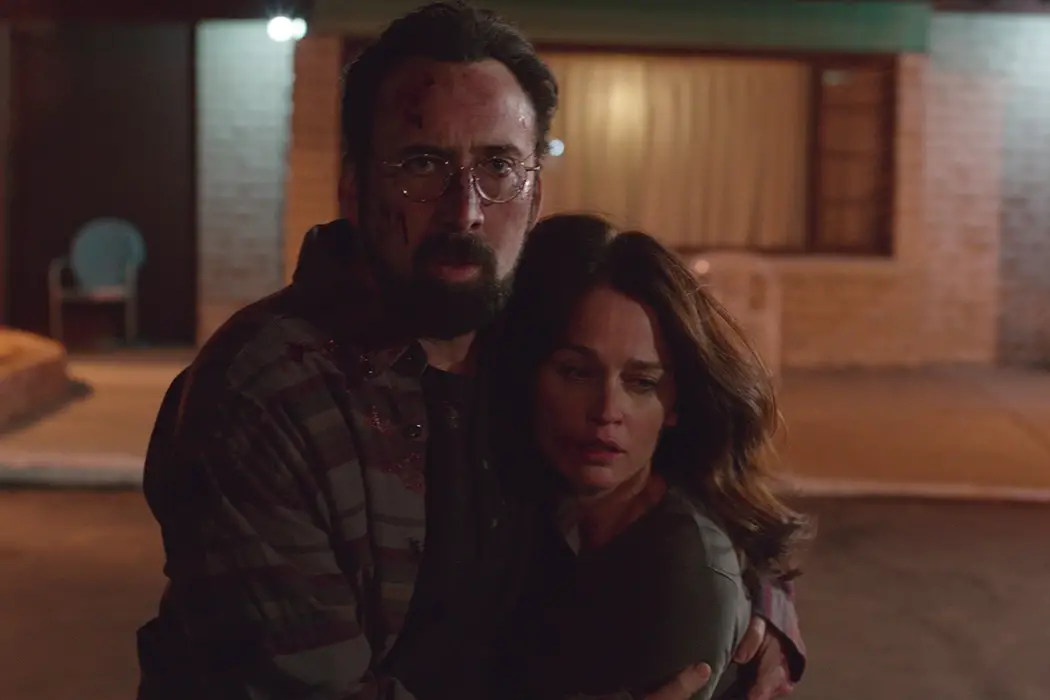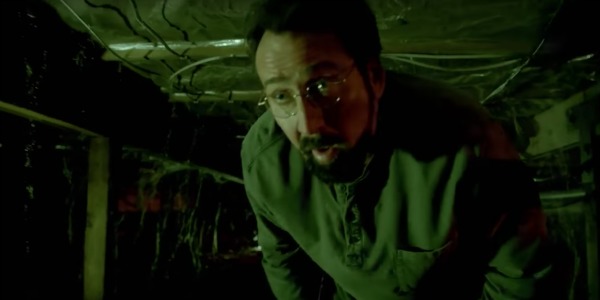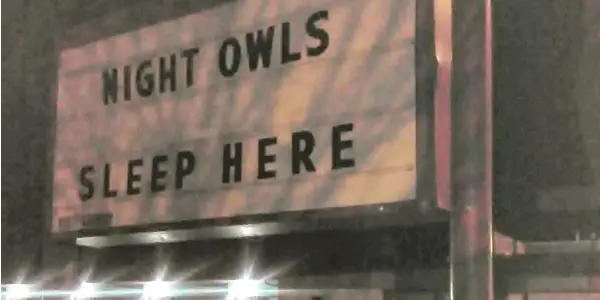LOOKING GLASS: Cage & Tunney Can’t Save This Mess

Alex Arabian is a freelance film journalist and filmmaker. His…
Nicolas Cage’s latest film, Looking Glass, is something of a Frankenstein’s monster that’s muddled in nostalgia and clichés. Looking Glass is director Tim Hunter’s (River’s Edge, 1986) first feature film in 14 years, and second in 21 years that isn’t a TV movie. Unfortunately, the veteran filmmaker, who has predominantly stuck to directing television since The Saint Of Fort Washington in 1993, appears to be a bit rusty at the helm of this narrative feature. Looking Glass has the look, feel, and sound of a ’90s mystery thriller with the help of Mark Adler (music department for Blue Velvet) and Kristin Gundred’s score, Kristi Shimek’s old school editing techniques, and shoddy work by the sound department. As such, the film’s throwback vibe grows tired quickly.
Cage and Robin Tunney give typically strong performances that elevate the subject matter and source material only slightly. Perhaps Looking Glass falls short most noticeably in the writing department; Jerry Rapp, known for his work on B-level horror and action films, and Matthew Wilder, who wrote Cage’s Dog Eat Dog in 2016, cram way too much into Looking Glass’s 103-minute runtime. The film is part voyeuristic thriller, part murder mystery, part romance, part marital drama, part Hitchkockian suspense, part kinky pulp shocker, and part midlife crisis exposé. Unfortunately, none of these elements come together neatly, and the thinly developed characters push the various storylines along at a grueling pace.
What The Heck Is Going On?
Looking Glass opens with Ray (Cage) and Maggie (Tunney) on the road in the desert, headed for a fresh start after a terrible tragedy. The audience sees flashes of what happened to them, from which they can infer that they lost their only daughter. There are only a few hints throughout the film as to how it happened and who was or wasn’t responsible in the accident. In a change of pace, they purchase the Night Owl, a seedy desert motel with a dark past. The owner, Ben (Bill Bolender) whom they purchased the motel from is a sketchy character holding an obvious secret, seemingly on the run and wanting to get as far away from the motel as possible.
We meet the regulars of the motel as Ray and Maggie adjust to their new lifestyle: Tommy (Ernie Lively), a truck driver who likes to use room 10 to take his prostitutes to late at night, Jessica (Jacque Gray), a mysterious woman in room 6, and her friend and possible lover, Strawberry Blonde (Kassia Conway), Howard (Marc Blucas), the suspicious sheriff hiding something who won’t stop visiting the motel everyday to make sure everything is running smoothly, and the gas station owner (Barry Jay Minoff) across the street who watches Ray and Maggie’s every move. Ray, much to Maggie’s disproval, decides to play detective and snoop around as the happenings become stranger and stranger at the Night Owl.

On one particular night out, Ray stumbles upon an underground tunnel that leads to a see-through mirror in one of the rooms. Turns out old Ben is a peeping Tom pervert. That’s when Looking Glass takes a decidedly weird turn. As soon as bodies begin to drop, things only get more bizarre. Rapp and Wilder should have focused on two or three subplots and written the two central characters more fully fleshed out in their screenplay. Instead, there’s so much going on that it’s difficult to follow. Furthermore, nothing in Looking Glass is really intriguing enough to want to find out whodunnit.
Stuck In Time
The veteran Hunter has had a wonderful directing career. For television, he’s directed episodes of Twin Peaks, Deadwood, Breaking Bad, Mad Men, Sons Of Anarchy, Dexter, Nip/Tuck, American Horror Story, and Hannibal. That’s impressive, to say the least. For some reason, however, Looking Glass has the aesthetic of a straight-to-VHS Tremors sequel or a low-budget late ’80s, early ’90s film adaptation of a popular television series. Perhaps it may reflect Ray and Maggie’s inability to move on from the tragedy they’ve endured. Or maybe it reflects the old architecture of the Night Owl. Whatever the reason is, it doesn’t feel agreeable.

Hunter uses some traditional camera angles, quick zooms, and familiar pans reminiscent of an older era of filmmaking, Adler and Gundred’s synth-heavy score sounds like a theme for a ’90s action TV series, and Shimek’s fade-to-black and other overused transitions complete the decades-old vibe to Looking Glass. If this were a period piece, perhaps the use of these tools would make sense. In Looking Glass, everything exciting happens at night, and, accordingly, the film has a considerably dim feel to it. Cinematographer Patrick Cady doesn’t bring much to the table aside from the occasional neon lighting.
Is There A Point To Any Of This?
That’s a question the viewer may ask themselves constantly throughout Looking Glass. It’s sporadically entertaining in between the “what just happened” moments, which barely makes the viewer want to keep watching until the end to see if any of the countless subplots and various plot devices come together as a whole. Spoiler alert: they don’t. There is no underlying message, theme or themes, or reason for most of the characters to act the way they do in the film. Perhaps most frustrating for the audience is that Looking Glass doesn’t make any sense. It’s a waste of such talented actors like Cage and Tunney, who give it their all to no avail.
Cage’s performance is laudably understated and Tunney reminds audiences that she deserves meatier roles than the ones she has been given of late. The two veterans have great chemistry together, but, again, even they can’t save Looking Glass from its many narrative and aesthetic shortcomings.
Looking Glass Conclusion: Watch Mom And Dad Instead
If you’re looking for a better Cage film, watch the recent Momentum Pictures (who also distributed Looking Glass) release Mom And Dad. It’s a much more exciting film with a brain. With Looking Glass, Cage is more mild-mannered, which isn’t a bad thing at all, as he gives an equally impressive performance, but it reflects the mood of the overall film; Looking Glass is a banal, confused mess of a film that doesn’t add up to anything at all except 103 wasted minutes.
Looking Glass wastes its talented cast on poor writing filled with cliché after cliché, an odd and uninviting artistic vision from the ground up, thinly developed characters, and an overabundance of narratives and plot devices.
Are you a fan of Hunter’s work? Will you see his latest, Looking Glass? If you have already, what was your take?
Looking Glass opening theatrically in the U.S. on February 16, 2018. For more information on its release, click here.
https://www.youtube.com/watch?v=N9ryKS8TrDY
Does content like this matter to you?
Become a Member and support film journalism. Unlock access to all of Film Inquiry`s great articles. Join a community of like-minded readers who are passionate about cinema - get access to our private members Network, give back to independent filmmakers, and more.
Alex Arabian is a freelance film journalist and filmmaker. His work has been featured in the San Francisco Examiner, The Playlist, Awards Circuit, and Pop Matters. His favorite film is Edward Scissorhands. Check out more of his work on makingacinephile.com!













